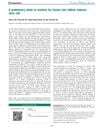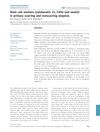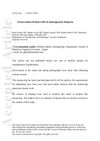 6 citations,
May 2013 in “PloS one”
6 citations,
May 2013 in “PloS one” The Foxn1(-/-) nude mouse shows disrupted and expanded skin stem cell areas due to high Lhx2 levels.
 10 citations,
September 2022 in “Cellular and Molecular Life Sciences”
10 citations,
September 2022 in “Cellular and Molecular Life Sciences” SOX9 is essential for the development of various organs and hair follicles.
 April 2024 in “Pigment cell & melanoma research”
April 2024 in “Pigment cell & melanoma research” Different types of resting melanocyte stem cells have unique characteristics and vary in their potential to become other cells.
 March 2020 in “Central European Journal of Biology”
March 2020 in “Central European Journal of Biology” The study found that stem cells and neutrophils are important for regenerating hair follicle structures in mice.
 1 citations,
March 2019 in “Chinese Medical Journal”
1 citations,
March 2019 in “Chinese Medical Journal” Researchers identified potential markers for human hair color stem cells.
 25 citations,
July 2008 in “British Journal of Dermatology”
25 citations,
July 2008 in “British Journal of Dermatology” CD10 and CD34 levels change during hair development and different hair growth stages, which could be important for hair regeneration treatments.

The treatment successfully integrated hair follicles into a dermal template, showing new hair growth and blood vessel formation.
 September 2023 in “bioRxiv (Cold Spring Harbor Laboratory)”
September 2023 in “bioRxiv (Cold Spring Harbor Laboratory)” Some hair growth cells remain in partially bald areas of Indian men with hair loss.
 54 citations,
January 2009 in “British Journal of Dermatology”
54 citations,
January 2009 in “British Journal of Dermatology” Scarring alopecia affects different hair follicle stem cells than nonscarring alopecia, and the infundibular region could be a new treatment target.
 November 2013 in “Faculty Opinions – Post-Publication Peer Review of the Biomedical Literature”
November 2013 in “Faculty Opinions – Post-Publication Peer Review of the Biomedical Literature” Injecting CD34+ cell-containing platelet-rich plasma can improve pattern hair loss more than placental extract treatment.
 March 2024 in “Journal of functional foods”
March 2024 in “Journal of functional foods” Collagen peptides from marine and bovine sources may help prevent hair loss by affecting hair follicle stem cells differently.
 56 citations,
May 2017 in “Nature Cell Biology”
56 citations,
May 2017 in “Nature Cell Biology” Hair can regrow after certain stem cells are lost because other stem cells can take over their role.
 30 citations,
February 2017 in “Histochemistry and Cell Biology”
30 citations,
February 2017 in “Histochemistry and Cell Biology” TPA promotes hair growth by increasing stem cell activity and activating specific cell signals.

Collagen peptides may help maintain hair growth and could be beneficial for hair loss conditions.
 June 2020 in “Journal of cosmetic medicine”
June 2020 in “Journal of cosmetic medicine” TriCell CD34+ cell-containing PRP therapy improves hair thickness and density in alopecia patients without side effects.
 11 citations,
September 2019 in “Dermatologic Surgery”
11 citations,
September 2019 in “Dermatologic Surgery” A substance called Vascular Endothelial Growth Factor can protect certain hair follicle stem cells from damage caused by androgens, suggesting a new possible treatment for hair loss.
 88 citations,
July 2019 in “International Journal of Molecular Sciences”
88 citations,
July 2019 in “International Journal of Molecular Sciences” Using human fat tissue derived stem cells in micrografts can safely and effectively increase hair density in people with hair loss.
 June 2019 in “The Egyptian Journal of Histology”
June 2019 in “The Egyptian Journal of Histology” Hyaluronic acid injections improve skin thickness and quality, protecting against aging in rats.
 316 citations,
June 2017 in “Stem Cell Research & Therapy”
316 citations,
June 2017 in “Stem Cell Research & Therapy” Fat tissue-derived cells show promise for repairing body tissues, but more research and regulation are needed for safe use.
 88 citations,
December 2012 in “Journal of The European Academy of Dermatology and Venereology”
88 citations,
December 2012 in “Journal of The European Academy of Dermatology and Venereology” Injecting CD34+ cell-containing platelet-rich plasma into the scalp can improve hair count and thickness in people with pattern hair loss.
4 citations,
January 2016 in “Methods in molecular biology” Hair follicle stem cells can become nerve cells using specific treatments.
 October 2017 in “Journal of The European Academy of Dermatology and Venereology”
October 2017 in “Journal of The European Academy of Dermatology and Venereology” Stem cells preservation in AGA could be a potential therapy, but more cases needed.
4 citations,
January 2011 in “Cell stem cell” Hair follicle stem cells can return to their original niche and help regenerate hair.
 53 citations,
April 2014 in “Experimental Dermatology”
53 citations,
April 2014 in “Experimental Dermatology” Wnt10b makes hair follicles bigger, but DKK1 can reverse this effect.
 March 2024 in “Journal of Cosmetic Dermatology”
March 2024 in “Journal of Cosmetic Dermatology” Laser-pretreated blood for hair loss treatment was more effective and increased stem cells.
 54 citations,
December 2014 in “Wound Repair and Regeneration”
54 citations,
December 2014 in “Wound Repair and Regeneration” PRP injections may improve hair thickness and density in female hair loss patients.
1 citations,
December 2018 in “IOP conference series. Materials science and engineering” CD34+ hair follicle stem cells can become melanin-producing cells for treating skin conditions.
 235 citations,
January 2011 in “Journal of Clinical Investigation”
235 citations,
January 2011 in “Journal of Clinical Investigation” Men with baldness due to androgenetic alopecia still have hair stem cells, but lack specific cells needed for hair growth.
 688 citations,
June 2007 in “Cell Stem Cell”
688 citations,
June 2007 in “Cell Stem Cell” Removing the ATR gene in adult mice causes rapid aging and stem cell loss.
18 citations,
October 2014 in “In vitro cellular & developmental biology. Animal” Hair follicle stem cells can become neural cells using different methods, with varying efficiency.


























